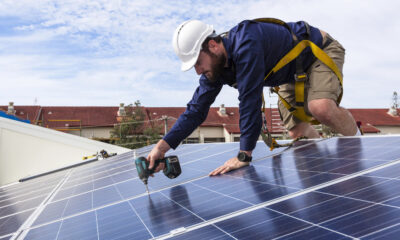

Energy
How To Use Solar Power Sustainably At Home
Solar energy is becoming an increasingly popular renewable energy source for homes and businesses worldwide. However, to get the most out of solar power, it’s important to maximize the efficiency of your solar panels. This means taking steps to ensure that your panels are operating at their highest possible capacity, and that you’re using energy in the most efficient way possible. In this article, we’ll take a closer look at some of the key strategies for maximizing solar panel efficiency, so you can start reaping the benefits of solar power today.
Understanding Solar Power
Solar power is a sustainable energy source that can generate electricity for residential homes. Solar cells are composed of semiconductor materials, such as silicon and gallium arsenide, that absorb sunlight photons and convert them into electric current. This process creates direct current (DC) electricity, which must then be converted into alternating current (AC) before it can be used in the home.
Several types of solar panels are available on the market today:
- Monocrystalline – is considered the most efficient type due to its higher temperature tolerance and improved performance under low light conditions.
- Polycrystalline – offer an economical alternative with similar efficiency levels but lower temperature tolerances than monocrystalline cells.
- Thin film photovoltaics – have lower efficiencies than both crystalline varieties; however, they may still provide an adequate output for some applications.
To determine how much solar power you need for your residence, calculate your average daily energy consumption in kilowatt-hours (kWh). When calculating the amount of solar power required for your home system, consider factors like local climate conditions and shading from adjacent buildings or trees.
Additionally, many utility companies offer incentives and rebates to homeowners who install a solar system on their property to help offset installation costs.
Lastly, when selecting a company to install your solar panel system, ensure they employ certified technicians with an experience like Smart Solar Energy or similar reliable companies. Installing these systems correctly and safely ensures you can maximize your investment over time.
Planning for Solar Power
A solar power system can reduce electricity costs and provide clean, renewable energy. Planning the installation process is essential to maximizing efficiency and ensuring you get the most out of your investment.
The first step in planning for solar power involves identifying locations with optimal sunlight exposure. It means considering roof orientation, shading from trees or nearby buildings, and tilt angle.
Once you have identified potential areas for your panels, evaluating your current energy usage is necessary to determine the number of panels needed.
Lastly, it’s crucial to consider your budget when selecting the type and size of equipment you need for installation. With careful planning and research before installation, you can ensure that your solar power system meets all your needs while providing maximum efficiency.
Installing Solar Panels
After conducting a thorough plan and layout for your solar panels, it’s time to install them. The first step is choosing the right panel type for one’s home. Solar panels come in many shapes and sizes with different efficiency ratings; therefore, thoroughly researching each option before purchasing is essential.
It is also beneficial to consult a professional with experience choosing and installing solar panels. They can provide valuable advice on deciding what suits one’s needs best. Once the necessary materials have been purchased, the next stage involves safely mounting them onto one’s roof or another that will receive direct sunlight exposure.
Depending on the size and number of solar panels installed, most homeowners are advised to hire an experienced installer rather than attempting to do it themselves, as it requires precision and skill. Most installers should offer a warranty on their work so that any issues encountered later can easily be fixed without additional cost.
To maximize its efficiency, you should regularly maintain your solar panel system throughout its lifetime. It includes cleaning dust away from photovoltaic cells regularly and checking all electrical connections twice annually at a minimum.
Additionally, if trees are nearby, they could block out sunlight during certain seasons or times of the day. These need to be addressed accordingly by either pruning or removing them altogether.
Although some initial costs are associated with setting up a residential solar energy system, once everything is running correctly, it can prove extremely rewarding over time in terms of environmental protection and financial savings due to reduced electricity bills.
With proper care and maintenance, well-installed systems can last for decades while producing clean energy efficiently year after year.
Maintaining Solar Panels
Proper maintenance of solar panels is essential for optimal performance and long-term reliability. Regular cleaning, inspection, and repair can help maintain the efficiency of a solar power system over time. It is crucial to ensure that all components are clean and in good working order regularly, as dirt buildup can reduce the effectiveness of the photovoltaic cells.
Inspections should also be done periodically to check for loose connections or other problems. In addition, any signs of physical damage, such as cracked glass, corrosion, or sagging frames, should be addressed promptly before they cause further issues with the system’s operation.
Diagnostic tests may need to be performed when troubleshooting common issues with solar panel systems. These tests will examine system parts’ current flow, voltage output, and temperature readings.
By comparing these readings against expected values, technicians can identify any irregularities that might indicate an issue with one or more components within the system. If necessary, faulty parts can then be replaced to restore proper functionality.
In some cases, replacing damaged solar panels may become necessary due to physical damage or simply age-related degradation in their performance capabilities. When this occurs, special care must be taken when handling them since they contain hazardous materials that could potentially harm people if not handled properly by certified personnel.
Furthermore, new panels must meet specific criteria, such as being compatible with existing components and having similar ratings for production capacity so that overall system performance does not suffer after installation.
Periodic maintenance is vital in keeping a solar power system running optimally throughout its lifetime; however, proper diagnosis and replacement of failed components are essential to preserving its effectiveness over time.
With careful attention given to all aspects involved in maintaining a solar panel installation – from inspections and cleaning to troubleshooting and component replacements – owners can enjoy reliable operations for many years without interruption.
Maximizing Solar Power Efficiency
Solar power is becoming an increasingly popular form of renewable energy, as it offers a clean and sustainable source of electricity. To ensure that this valuable resource is used efficiently, there are several strategies to maximize its potential.
These include using energy-efficient appliances in the home, implementing smart home technology for better optimization of energy usage, and storing excess solar power in batteries for future use.
Installing energy-efficient appliances can help reduce household energy consumption by up to 50%. This practice also helps to lower utility costs and increase savings. Appliances such as refrigerators, dishwashers, washing machines, dryers, and other electronic devices should be purchased with higher efficiency ratings.
Many retailers now offer Energy Star products that meet strict guidelines set by the US Department of Energy and Environmental Protection Agency (EPA).
Smart home technology provides another way to optimize the use of solar power within households.
By automating lighting systems or controlling thermostats remotely through smartphones or voice commands like Alexa, homeowners can use their stored solar power while minimizing wastefulness. Smart homes can also monitor usage patterns and alert users when they exceed preset spending thresholds or if any problems occur with their system.
Batteries are necessary to store any excess solar power generated during peak production times to be accessed later, particularly on days with low sunlight exposure or overcast weather conditions.
Systems such as Tesla Powerwall provide backup storage solutions that allow homeowners to charge their batteries from either the grid supply or their solar panels connected directly to the house’s main electrical panel box.
Such batteries have been shown to improve residential electricity bills by 30% due to reduced demand charges associated with peak electricity periods throughout the day or night.
In other words, maximizing the efficiency of solar power requires making some changes around your home, including installing more efficient appliances and leveraging smart technologies that enable you to control better the electric bill costs associated with your usage habits.
Additionally, investing in reliable batteries will help save money and provide access to stored energy whenever needed, regardless of external climate factors like cloud coverage, rain storms, etcetera.
Takeaway
Installing and maintaining solar panels is essential to ensuring the most efficient use of solar power for homes. Solar energy can be an excellent sustainable source of electricity. Still, it requires careful consideration when planning, installing, and maintaining these systems to maximize efficiency.
Properly installed and maintained solar panel systems will provide optimal performance throughout their lifetime. It is crucial that homeowners not only understand how solar power works but are also aware of the potential risks associated with its implementation.
By taking all necessary precautions and following best practices, homeowners can ensure they get the most out of this renewable energy resource.


 Environment12 months ago
Environment12 months agoAre Polymer Banknotes: an Eco-Friendly Trend or a Groundswell?

 Features11 months ago
Features11 months agoEco-Friendly Cryptocurrencies: Sustainable Investment Choices

 Features12 months ago
Features12 months agoEco-Friendly Crypto Traders Must Find the Right Exchange

 Energy11 months ago
Energy11 months agoThe Growing Role of Solar Panels in Ireland’s Energy Future



























